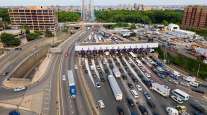Prioritize Projects to Ease Bottlenecks, Transportation Officials Tell Congress
This story appears in the July 1 print edition of Transport Topics.
Representatives of the freight transportation industry called on federal lawmakers to prioritize funding for projects that reduce bottlenecks and improve how cargo is transferred from one mode to another.
David Abney, chief operating officer of UPS Inc., said the government traditionally has thought of each mode of transportation in its own “silo,” while putting less emphasis on the transportation network as a whole.
“Congress has tried to link them together, but it’s still a patchwork,” Abney told members of the House Transportation and Infrastructure Committee’s special panel on freight transportation. “America needs a freight system that’s built like a network, and I encourage Congress to take a long-term, coordinated view of how the different modes can work together.”
The panel, led by Rep. John Duncan (R-Tenn.), held the June 26 Capitol Hill hearing to learn about the role that the logistics industry plays in the freight system.
Ed Hamberger, CEO of the Association of American Railroads, said the worst delays in the rail industry happen in the places where freight is transferred to another mode, such as ports and intermodal yards.
“We recommend that you continue to focus programs to improve the first mile and last mile connections for freight that is handed off from one mode to another . . . at intermodal terminals. Improving these connections will lead to large increases in efficiency and fluidity throughout the network,” he said.
Some representatives, such as Rep. Jerrold Nadler (D-N.Y.), the panel’s ranking member, and Rep. Dan Lipinski (D-Ill.), were receptive to the call for more infrastructure investment, but none endorsed a funding source.
Lipinski called for a fund to pay for projects of national and regional significance, which had previously existed but was not funded under last year’s highway bill known as MAP-21.
Financing is necessary “so that we can make sure we get the funding as needed for some of these really big projects that are critical to our nation,” he said.
The week before the House hearing, some members of the panel traveled to the Memphis, Tenn., area to tour the airfreight hub operated by FedEx Corp.’s Express unit at Memphis International Airport and the Port of Memphis, the fourth-largest inland port in the United States.
“By coming to Memphis, an important hub for U.S. freight transport, the panel was able to see firsthand how efficiencies can be replicated and where challenges continue to exist throughout our national transportation system,” Duncan said in a statement about his June 20-21 visit.
Members took the FedEx tour to learn how the hub operation uses logistics and technology, and the tour included pilot training facilities and package-sorting equipment, the panel said. At the Port of Memphis, lawmakers learned how a port that primarily handles bulk freight differs from a container-focused facility.
Also last week, a freight advisory committee, created to design a national freight policy, met for the first time at the U.S. Department of Transportation.
Nadler said at the June 25 meeting of members from across the country that “containers don’t vote, so they don’t get as much attention as passengers.”
The advisory committee consists of representatives from trucking, airports, railroads, ports, labor, local governments, environmental groups, shippers and safety advocates.
Outgoing Transportation Secretary Ray LaHood created the committee and appointed its members after the House of Representatives declined last year to include such a panel in MAP-21, the transportation reauthorization bill.
Sen. Maria Cantwell (D-Wash.), who tried to include an advisory committee in MAP-21, also spoke at the meeting, saying she’s passionate about freight because “by 2040, we will need to move 60% more . . . than we do today.”
She said the recent collapse of the Interstate 5 bridge in her state was a poignant sign that infrastructure already is under great strain.
“Freight bottlenecks cost companies $200 billion a year,” Cantwell said.
The first task for the advisory group, which is to make recommendations within two years, is to form subcommittees to address specific freight issues, something it will do over the next month.
Staff reporter Michele Fuetsch contributed to this story.


